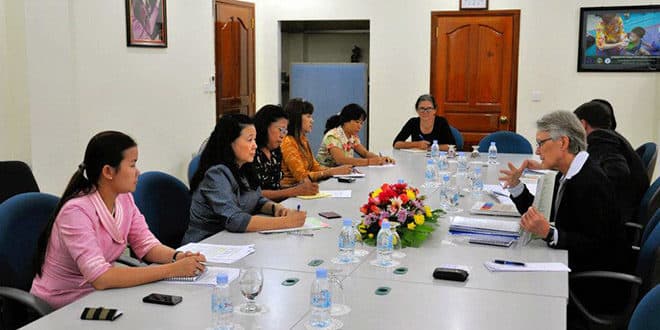Special thanks to Shagun Gupta for this how to guide
International assignments and project work are a defining aspect of development / aid work, be it through short-term consultancies or long-term contracts. As a development / aid worker, the chances of finding oneself working in different countries over the span of one’s career, are high.
Among the many dynamic factors that shape an international career, language occupies a unique position of authority. Young professionals and experienced industry experts alike often find themselves immersed in an unfamiliar social and cultural environment, tasked with approaching a survey or project with a staff that is predominantly local. In such environments, language barriers can emerge as a significant challenge while working with diverse teams.
This How-to Guide is mainly aimed at individuals who are from native English speaking countries, or are comfortable using English in a professional environment. As an English speaker, stepping into a professional role in a country where English is not spoken widely or at all, can be difficult. As a non-native speaker in such contexts, how does one approach development work effectively?
Clear Communication
Communication is the foundation upon which any strong professional effort is built. Be it an individual consultancy or a highly complex development project, the nature of the sector does not allow one to operate in isolation. As a non-native speaker, two skills are key: clarity and patience.
When communicating ideas as a non-native speaker, try to be as clear as possible. This involves addressing questions and comments directly, and keeping the use of language specific phrases and idioms to the minimum. Additionally, try to avoid jargon unless it is relevant to the work being done and is comprehended by those you are working with.
Communication as a non-native speaker also requires patience. Make generous use of pauses between sentences, and be conscious of pace. Often, speaking slowly and enunciating each word clearly can help your co-workers understand your ideas better and respond to them adequately. An important aspect of communication as a non-native speaker is to allow enough time for clear communication when completing time critical tasks with a diverse team. This might also involve repeating things until they have been understood by everyone, and regularly paraphrasing ideas to address communication gaps.
Observation and Osmosis
In an office environment where the majority of staff are local and speak a different language in their day-to-day conversations, it can be difficult to form strong working relationships that transcend the language barrier. In order to feel more comfortable with your colleagues, use observation and osmosis. Being mindful of your working space is important in order to find patterns and commonalities between yourself and those you work with, in order to bridge the language gap over time. These can be smaller details such as observing local food habits during lunch, to bigger details such as how colleagues respond to deadlines. In many cultural contexts, the concept of time for instance, is approached differently and the use of deadlines is minimal. Depending on individual and group working styles, be open to change and adapt accordingly.
Allow osmosis to take place within your team, especially if you’re in a managerial position. Regularly organise informal team meetings where members can bounce ideas off each other about a specific task or the entire project as a whole. Ask questions, provide considerate feedback, and encourage an environment of mutual learning where individuals are able to understand and analyse behaviours of team members. Over time, this process can serve to minimise the language gap by emphasising working relationships built on a healthy assimilation of different personality types.
Question Hour
Whether you are working as an individual consultant or with a team, organise a formal question hour each week with your colleagues to raise concerns, address problems, and review successes. In many project cycles, such interactions form a keystone of the monitoring progress and are integrated into individual and team work plans. However, if you’re a consultant working outside of a regular office environment, and with fewer chances to interact in-person with your colleagues, you might need to schedule a weekly question hour yourself. Although in-person interactions are most effective, other options such as video conferencing might prove to be useful as well.
The purpose of such a question hour should primarily be to give each party a chance to go through specific goals, assess whether everyone is on the same page in terms of goal achievement, and consider any grievances and / or challenges. As a non-native speaker, regular communication is key and at times repetition might necessary to ensure everything has been correctly understood. A question hour, no matter what shape or form it takes, aids the process by specifically targeting the scope for miscommunication.
Group Values vs. Individual Values
To ensure individual and group success in a professional setting, it is important to consider differences in value systems that emerge as a result of cultural relativity. An important step as a non-native speaker is to find synergy between group values and individual values.
As an outsider, you might find that the local staff at your organisation has vastly different meanings attached to concepts such as integrity, hard work, equality, and compassion. It is important to keep value judgements at bay when operating in culturally diverse professional environments, especially if language barriers prohibit an adequate resolution of conflict. In many cultures, group values might take precedence over individual values and effort, with a strong focus on morality. Respecting group values that might be different to your own individual values is key to managing conflict. Remember to take a step back if your ideas are not being received well by your team, and consider taking advice from individual members instead. If there are certain behaviours that strike you as particularly against your values, consider approaching a higher authority to evaluate your options. If you are the higher authority yourself, it might be necessary for you to decide whether the conflict of values harms the organisational mandate.
Keeping up a steady balance between group values and individual values might not be an easy task, but communicating the importance of the balance to your colleagues at the very beginning can help.
Bonus tip: Language learning!
As a non-native speaker on a short term contract, it might not be possible to devote time and attention to language learning. At the same time, it might still be possible to pick up words and phrases that can help traverse the language landscape of your professional environment, and help you settle in. For those on long-term contracts, it might be worth investing in a good local tutor who can teach you the language.
A good way to break language barriers in your working environment could be a language exchange between colleagues. Mutually investing in each other’s languages can foster growth and build respect, and make the process of working together more fun and interesting!
Photo by UN ISDR




